Reflective Journal: Communication, Trust, and Skills Development
VerifiedAdded on 2022/11/28
|8
|1871
|257
Journal and Reflective Writing
AI Summary
This reflective journal explores the author's communication abilities, focusing on how active listening and other skills contribute to building and maintaining trust in relationships. The journal details both strengths, such as active listening and intellectualism in communication, and weaknesses, including assertiveness and interpersonal skills, particularly in intergenerational and cross-cultural communication. The author provides anecdotal evidence, including experiences with language barriers, to support the reflections. The journal incorporates self-assessment, evaluations, and reflection on personal development, including the use of management techniques and time management to improve professional capabilities. The conclusion highlights the importance of various skills for successful project management and the ability to manage internal and external factors that affect project completion. Finally, the author outlines the importance of time management and the assignment of work to different teams to ensure the project is completed on time.
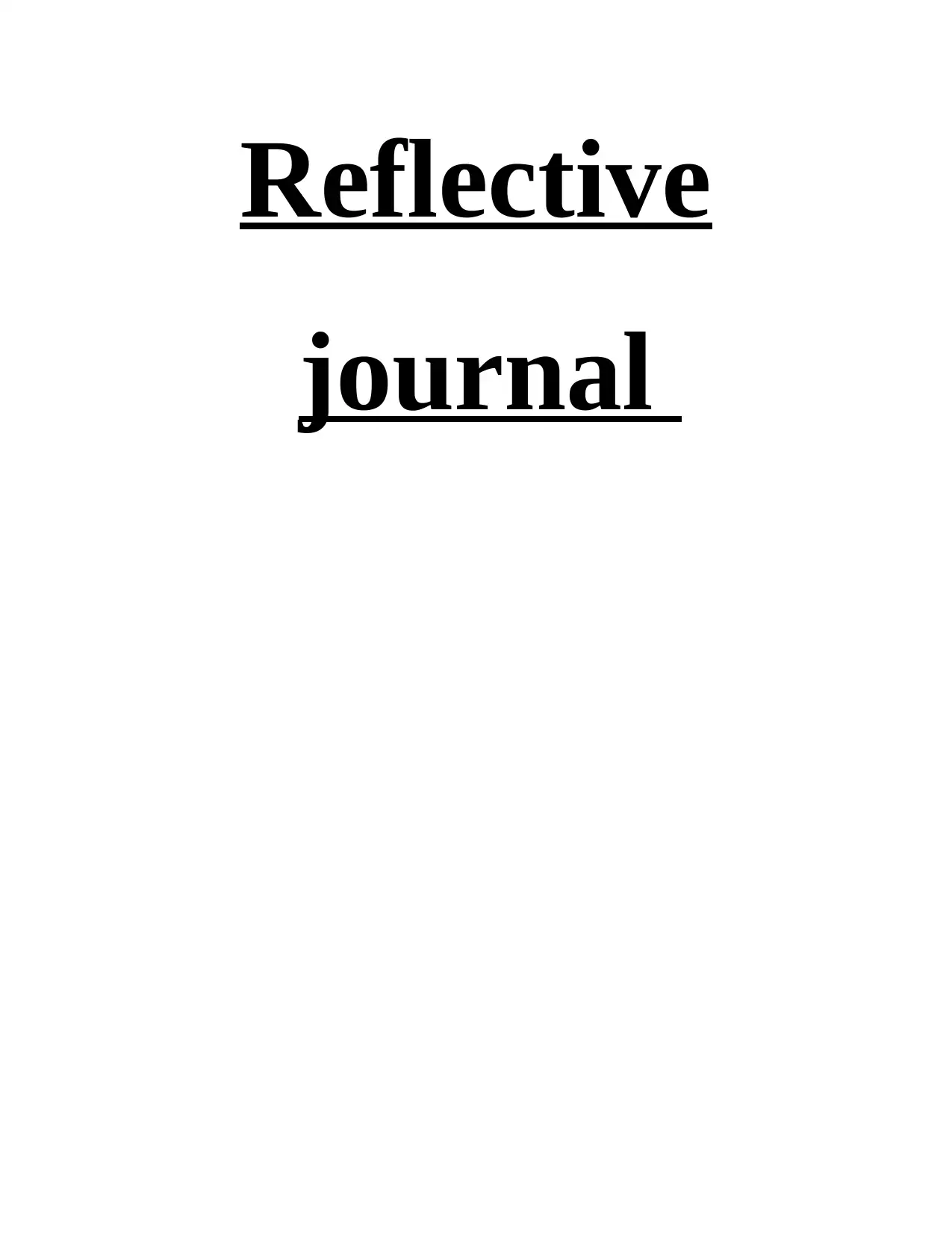
Reflective
journal
journal
Paraphrase This Document
Need a fresh take? Get an instant paraphrase of this document with our AI Paraphraser
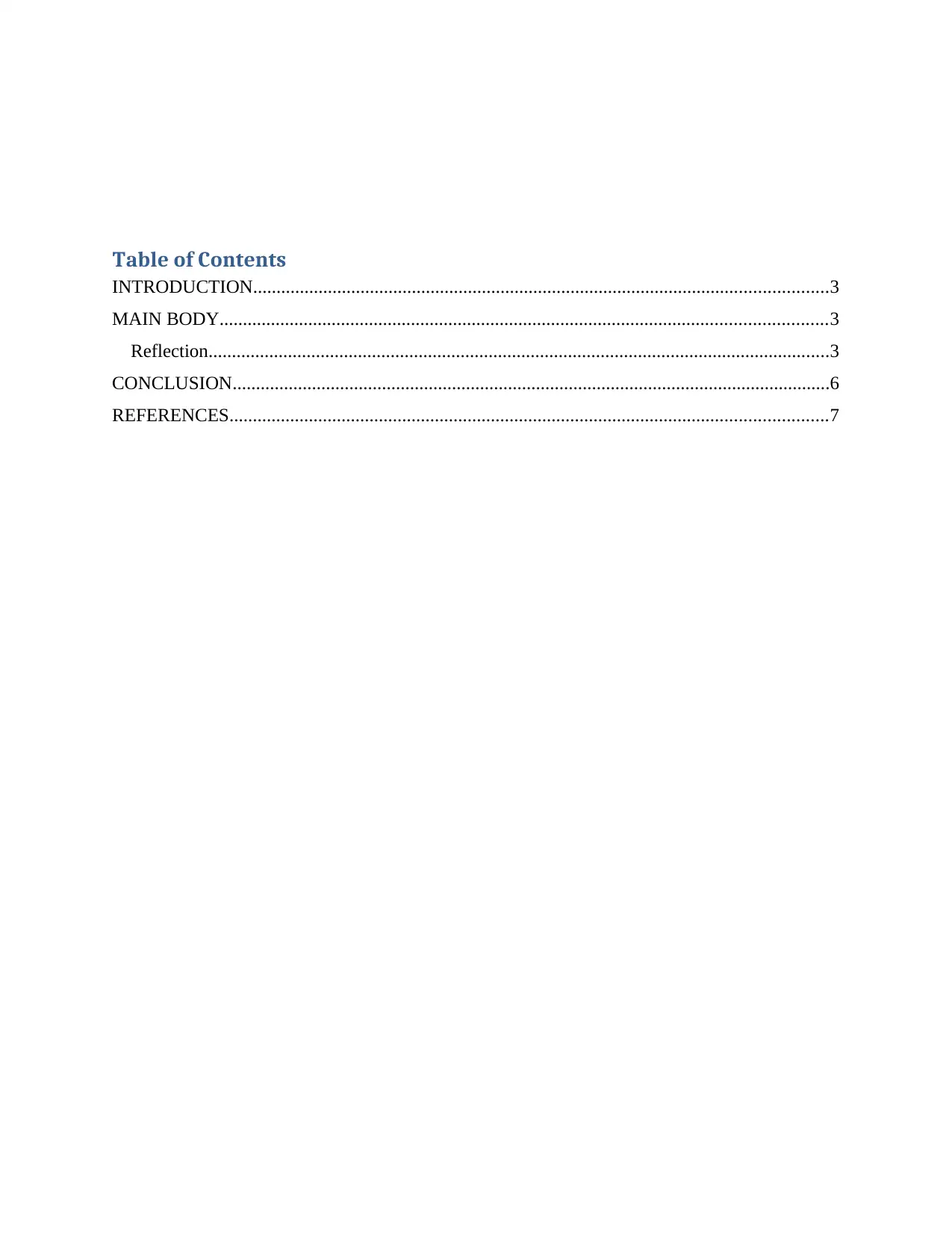
Table of Contents
INTRODUCTION...........................................................................................................................3
MAIN BODY..................................................................................................................................3
Reflection.....................................................................................................................................3
CONCLUSION................................................................................................................................6
REFERENCES................................................................................................................................7
INTRODUCTION...........................................................................................................................3
MAIN BODY..................................................................................................................................3
Reflection.....................................................................................................................................3
CONCLUSION................................................................................................................................6
REFERENCES................................................................................................................................7
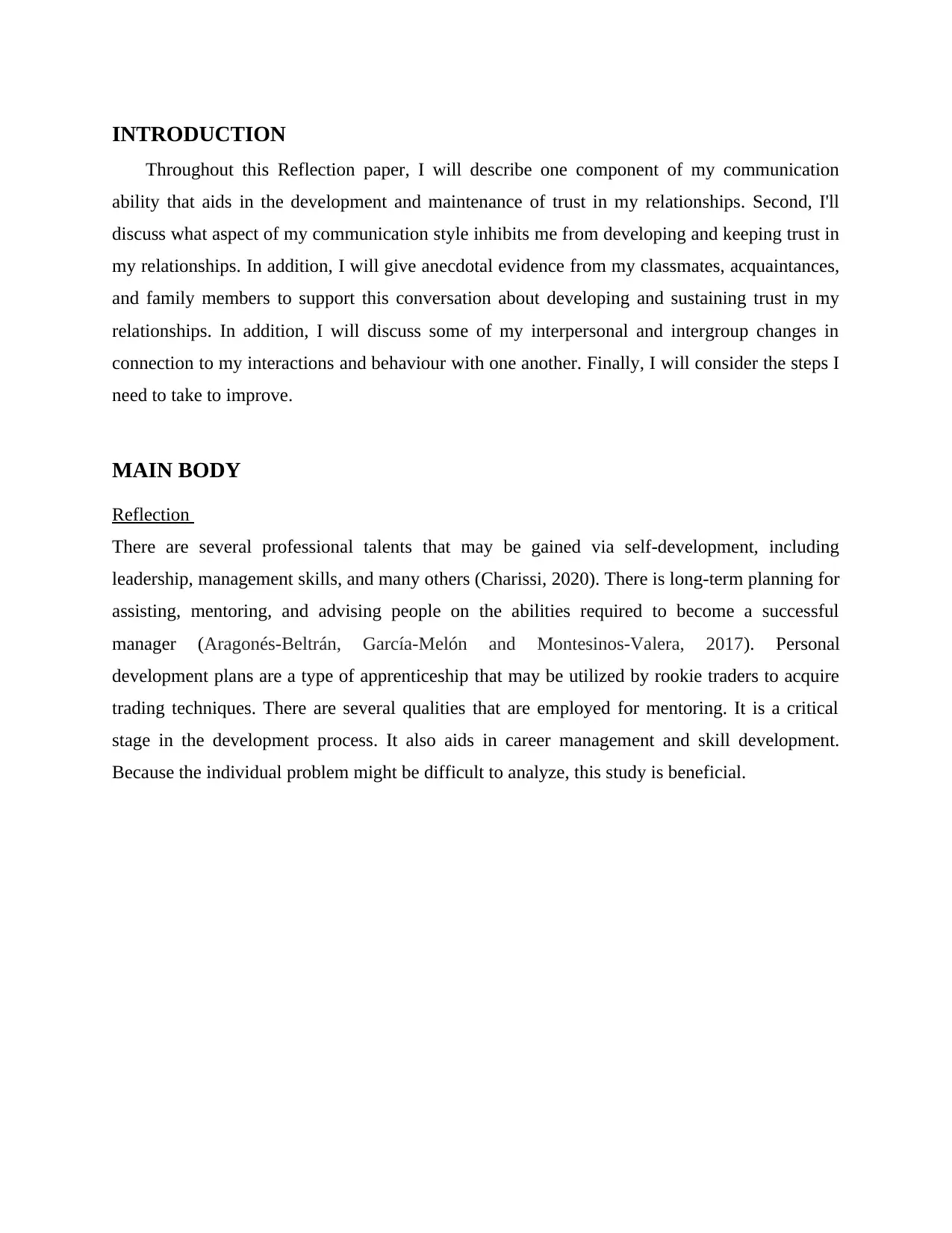
INTRODUCTION
Throughout this Reflection paper, I will describe one component of my communication
ability that aids in the development and maintenance of trust in my relationships. Second, I'll
discuss what aspect of my communication style inhibits me from developing and keeping trust in
my relationships. In addition, I will give anecdotal evidence from my classmates, acquaintances,
and family members to support this conversation about developing and sustaining trust in my
relationships. In addition, I will discuss some of my interpersonal and intergroup changes in
connection to my interactions and behaviour with one another. Finally, I will consider the steps I
need to take to improve.
MAIN BODY
Reflection
There are several professional talents that may be gained via self-development, including
leadership, management skills, and many others (Charissi, 2020). There is long-term planning for
assisting, mentoring, and advising people on the abilities required to become a successful
manager (Aragonés-Beltrán, García-Melón and Montesinos-Valera, 2017). Personal
development plans are a type of apprenticeship that may be utilized by rookie traders to acquire
trading techniques. There are several qualities that are employed for mentoring. It is a critical
stage in the development process. It also aids in career management and skill development.
Because the individual problem might be difficult to analyze, this study is beneficial.
Throughout this Reflection paper, I will describe one component of my communication
ability that aids in the development and maintenance of trust in my relationships. Second, I'll
discuss what aspect of my communication style inhibits me from developing and keeping trust in
my relationships. In addition, I will give anecdotal evidence from my classmates, acquaintances,
and family members to support this conversation about developing and sustaining trust in my
relationships. In addition, I will discuss some of my interpersonal and intergroup changes in
connection to my interactions and behaviour with one another. Finally, I will consider the steps I
need to take to improve.
MAIN BODY
Reflection
There are several professional talents that may be gained via self-development, including
leadership, management skills, and many others (Charissi, 2020). There is long-term planning for
assisting, mentoring, and advising people on the abilities required to become a successful
manager (Aragonés-Beltrán, García-Melón and Montesinos-Valera, 2017). Personal
development plans are a type of apprenticeship that may be utilized by rookie traders to acquire
trading techniques. There are several qualities that are employed for mentoring. It is a critical
stage in the development process. It also aids in career management and skill development.
Because the individual problem might be difficult to analyze, this study is beneficial.
⊘ This is a preview!⊘
Do you want full access?
Subscribe today to unlock all pages.

Trusted by 1+ million students worldwide
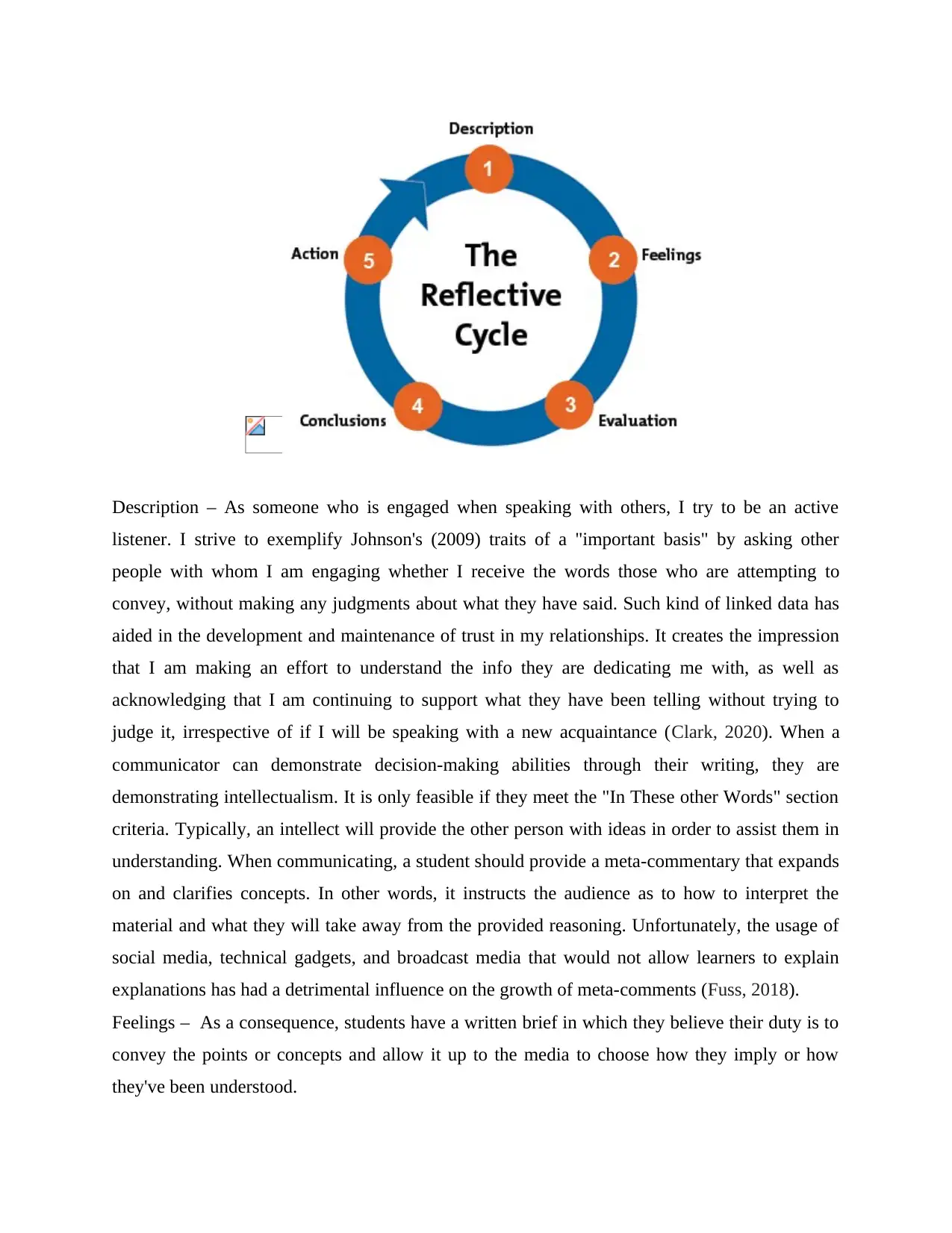
Description – As someone who is engaged when speaking with others, I try to be an active
listener. I strive to exemplify Johnson's (2009) traits of a "important basis" by asking other
people with whom I am engaging whether I receive the words those who are attempting to
convey, without making any judgments about what they have said. Such kind of linked data has
aided in the development and maintenance of trust in my relationships. It creates the impression
that I am making an effort to understand the info they are dedicating me with, as well as
acknowledging that I am continuing to support what they have been telling without trying to
judge it, irrespective of if I will be speaking with a new acquaintance (Clark, 2020). When a
communicator can demonstrate decision-making abilities through their writing, they are
demonstrating intellectualism. It is only feasible if they meet the "In These other Words" section
criteria. Typically, an intellect will provide the other person with ideas in order to assist them in
understanding. When communicating, a student should provide a meta-commentary that expands
on and clarifies concepts. In other words, it instructs the audience as to how to interpret the
material and what they will take away from the provided reasoning. Unfortunately, the usage of
social media, technical gadgets, and broadcast media that would not allow learners to explain
explanations has had a detrimental influence on the growth of meta-comments (Fuss, 2018).
Feelings – As a consequence, students have a written brief in which they believe their duty is to
convey the points or concepts and allow it up to the media to choose how they imply or how
they've been understood.
listener. I strive to exemplify Johnson's (2009) traits of a "important basis" by asking other
people with whom I am engaging whether I receive the words those who are attempting to
convey, without making any judgments about what they have said. Such kind of linked data has
aided in the development and maintenance of trust in my relationships. It creates the impression
that I am making an effort to understand the info they are dedicating me with, as well as
acknowledging that I am continuing to support what they have been telling without trying to
judge it, irrespective of if I will be speaking with a new acquaintance (Clark, 2020). When a
communicator can demonstrate decision-making abilities through their writing, they are
demonstrating intellectualism. It is only feasible if they meet the "In These other Words" section
criteria. Typically, an intellect will provide the other person with ideas in order to assist them in
understanding. When communicating, a student should provide a meta-commentary that expands
on and clarifies concepts. In other words, it instructs the audience as to how to interpret the
material and what they will take away from the provided reasoning. Unfortunately, the usage of
social media, technical gadgets, and broadcast media that would not allow learners to explain
explanations has had a detrimental influence on the growth of meta-comments (Fuss, 2018).
Feelings – As a consequence, students have a written brief in which they believe their duty is to
convey the points or concepts and allow it up to the media to choose how they imply or how
they've been understood.
Paraphrase This Document
Need a fresh take? Get an instant paraphrase of this document with our AI Paraphraser
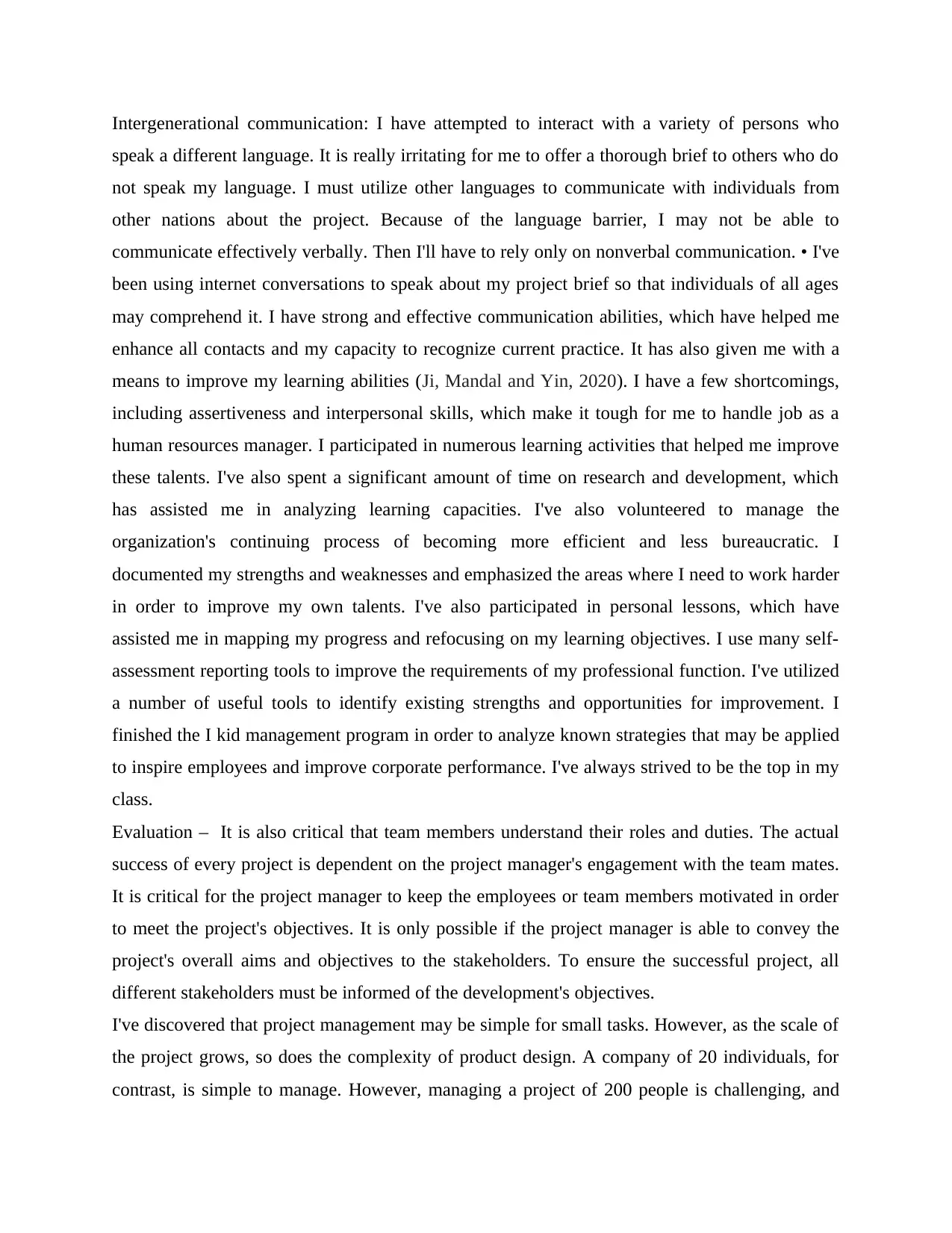
Intergenerational communication: I have attempted to interact with a variety of persons who
speak a different language. It is really irritating for me to offer a thorough brief to others who do
not speak my language. I must utilize other languages to communicate with individuals from
other nations about the project. Because of the language barrier, I may not be able to
communicate effectively verbally. Then I'll have to rely only on nonverbal communication. • I've
been using internet conversations to speak about my project brief so that individuals of all ages
may comprehend it. I have strong and effective communication abilities, which have helped me
enhance all contacts and my capacity to recognize current practice. It has also given me with a
means to improve my learning abilities (Ji, Mandal and Yin, 2020). I have a few shortcomings,
including assertiveness and interpersonal skills, which make it tough for me to handle job as a
human resources manager. I participated in numerous learning activities that helped me improve
these talents. I've also spent a significant amount of time on research and development, which
has assisted me in analyzing learning capacities. I've also volunteered to manage the
organization's continuing process of becoming more efficient and less bureaucratic. I
documented my strengths and weaknesses and emphasized the areas where I need to work harder
in order to improve my own talents. I've also participated in personal lessons, which have
assisted me in mapping my progress and refocusing on my learning objectives. I use many self-
assessment reporting tools to improve the requirements of my professional function. I've utilized
a number of useful tools to identify existing strengths and opportunities for improvement. I
finished the I kid management program in order to analyze known strategies that may be applied
to inspire employees and improve corporate performance. I've always strived to be the top in my
class.
Evaluation – It is also critical that team members understand their roles and duties. The actual
success of every project is dependent on the project manager's engagement with the team mates.
It is critical for the project manager to keep the employees or team members motivated in order
to meet the project's objectives. It is only possible if the project manager is able to convey the
project's overall aims and objectives to the stakeholders. To ensure the successful project, all
different stakeholders must be informed of the development's objectives.
I've discovered that project management may be simple for small tasks. However, as the scale of
the project grows, so does the complexity of product design. A company of 20 individuals, for
contrast, is simple to manage. However, managing a project of 200 people is challenging, and
speak a different language. It is really irritating for me to offer a thorough brief to others who do
not speak my language. I must utilize other languages to communicate with individuals from
other nations about the project. Because of the language barrier, I may not be able to
communicate effectively verbally. Then I'll have to rely only on nonverbal communication. • I've
been using internet conversations to speak about my project brief so that individuals of all ages
may comprehend it. I have strong and effective communication abilities, which have helped me
enhance all contacts and my capacity to recognize current practice. It has also given me with a
means to improve my learning abilities (Ji, Mandal and Yin, 2020). I have a few shortcomings,
including assertiveness and interpersonal skills, which make it tough for me to handle job as a
human resources manager. I participated in numerous learning activities that helped me improve
these talents. I've also spent a significant amount of time on research and development, which
has assisted me in analyzing learning capacities. I've also volunteered to manage the
organization's continuing process of becoming more efficient and less bureaucratic. I
documented my strengths and weaknesses and emphasized the areas where I need to work harder
in order to improve my own talents. I've also participated in personal lessons, which have
assisted me in mapping my progress and refocusing on my learning objectives. I use many self-
assessment reporting tools to improve the requirements of my professional function. I've utilized
a number of useful tools to identify existing strengths and opportunities for improvement. I
finished the I kid management program in order to analyze known strategies that may be applied
to inspire employees and improve corporate performance. I've always strived to be the top in my
class.
Evaluation – It is also critical that team members understand their roles and duties. The actual
success of every project is dependent on the project manager's engagement with the team mates.
It is critical for the project manager to keep the employees or team members motivated in order
to meet the project's objectives. It is only possible if the project manager is able to convey the
project's overall aims and objectives to the stakeholders. To ensure the successful project, all
different stakeholders must be informed of the development's objectives.
I've discovered that project management may be simple for small tasks. However, as the scale of
the project grows, so does the complexity of product design. A company of 20 individuals, for
contrast, is simple to manage. However, managing a project of 200 people is challenging, and
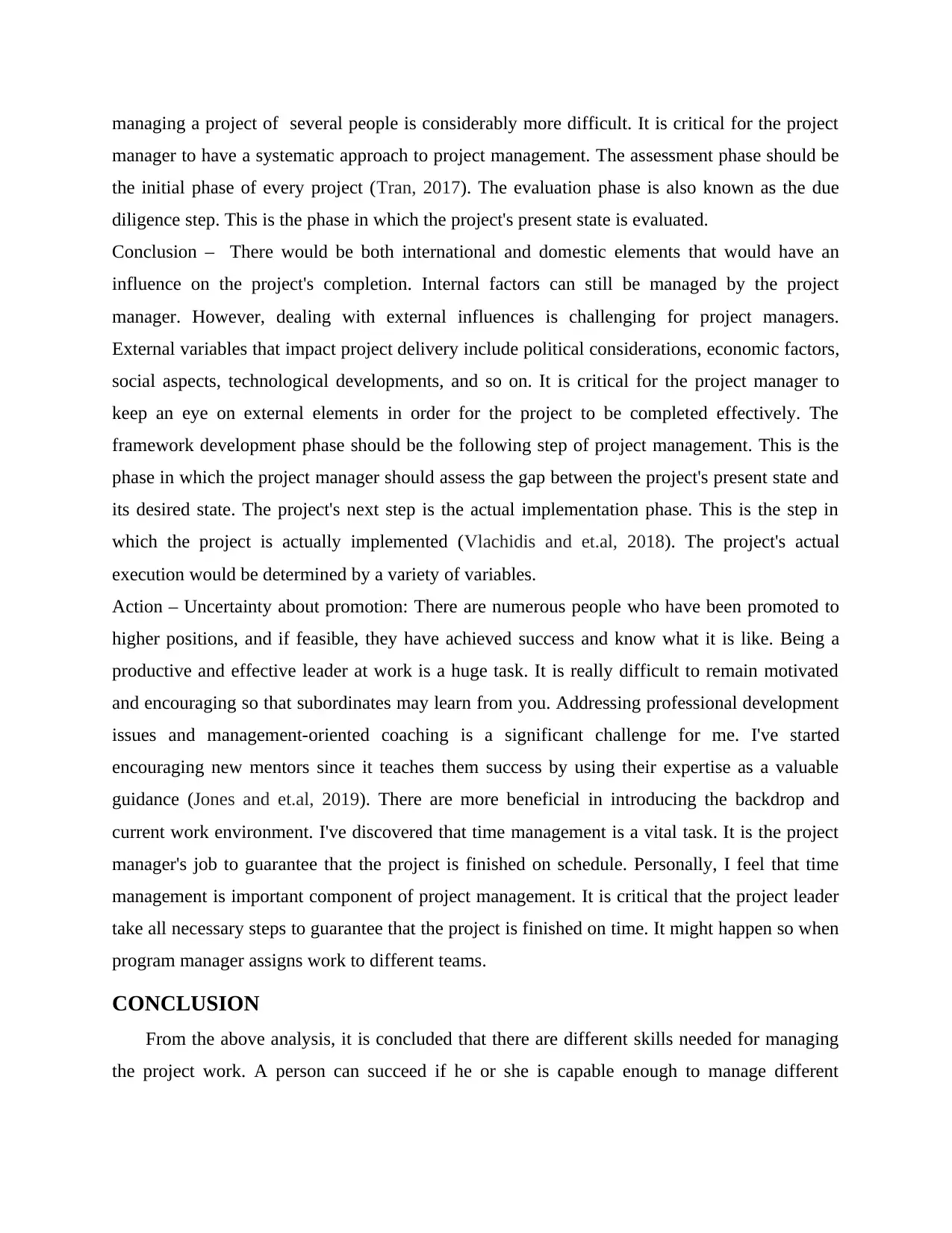
managing a project of several people is considerably more difficult. It is critical for the project
manager to have a systematic approach to project management. The assessment phase should be
the initial phase of every project (Tran, 2017). The evaluation phase is also known as the due
diligence step. This is the phase in which the project's present state is evaluated.
Conclusion – There would be both international and domestic elements that would have an
influence on the project's completion. Internal factors can still be managed by the project
manager. However, dealing with external influences is challenging for project managers.
External variables that impact project delivery include political considerations, economic factors,
social aspects, technological developments, and so on. It is critical for the project manager to
keep an eye on external elements in order for the project to be completed effectively. The
framework development phase should be the following step of project management. This is the
phase in which the project manager should assess the gap between the project's present state and
its desired state. The project's next step is the actual implementation phase. This is the step in
which the project is actually implemented (Vlachidis and et.al, 2018). The project's actual
execution would be determined by a variety of variables.
Action – Uncertainty about promotion: There are numerous people who have been promoted to
higher positions, and if feasible, they have achieved success and know what it is like. Being a
productive and effective leader at work is a huge task. It is really difficult to remain motivated
and encouraging so that subordinates may learn from you. Addressing professional development
issues and management-oriented coaching is a significant challenge for me. I've started
encouraging new mentors since it teaches them success by using their expertise as a valuable
guidance (Jones and et.al, 2019). There are more beneficial in introducing the backdrop and
current work environment. I've discovered that time management is a vital task. It is the project
manager's job to guarantee that the project is finished on schedule. Personally, I feel that time
management is important component of project management. It is critical that the project leader
take all necessary steps to guarantee that the project is finished on time. It might happen so when
program manager assigns work to different teams.
CONCLUSION
From the above analysis, it is concluded that there are different skills needed for managing
the project work. A person can succeed if he or she is capable enough to manage different
manager to have a systematic approach to project management. The assessment phase should be
the initial phase of every project (Tran, 2017). The evaluation phase is also known as the due
diligence step. This is the phase in which the project's present state is evaluated.
Conclusion – There would be both international and domestic elements that would have an
influence on the project's completion. Internal factors can still be managed by the project
manager. However, dealing with external influences is challenging for project managers.
External variables that impact project delivery include political considerations, economic factors,
social aspects, technological developments, and so on. It is critical for the project manager to
keep an eye on external elements in order for the project to be completed effectively. The
framework development phase should be the following step of project management. This is the
phase in which the project manager should assess the gap between the project's present state and
its desired state. The project's next step is the actual implementation phase. This is the step in
which the project is actually implemented (Vlachidis and et.al, 2018). The project's actual
execution would be determined by a variety of variables.
Action – Uncertainty about promotion: There are numerous people who have been promoted to
higher positions, and if feasible, they have achieved success and know what it is like. Being a
productive and effective leader at work is a huge task. It is really difficult to remain motivated
and encouraging so that subordinates may learn from you. Addressing professional development
issues and management-oriented coaching is a significant challenge for me. I've started
encouraging new mentors since it teaches them success by using their expertise as a valuable
guidance (Jones and et.al, 2019). There are more beneficial in introducing the backdrop and
current work environment. I've discovered that time management is a vital task. It is the project
manager's job to guarantee that the project is finished on schedule. Personally, I feel that time
management is important component of project management. It is critical that the project leader
take all necessary steps to guarantee that the project is finished on time. It might happen so when
program manager assigns work to different teams.
CONCLUSION
From the above analysis, it is concluded that there are different skills needed for managing
the project work. A person can succeed if he or she is capable enough to manage different
⊘ This is a preview!⊘
Do you want full access?
Subscribe today to unlock all pages.

Trusted by 1+ million students worldwide
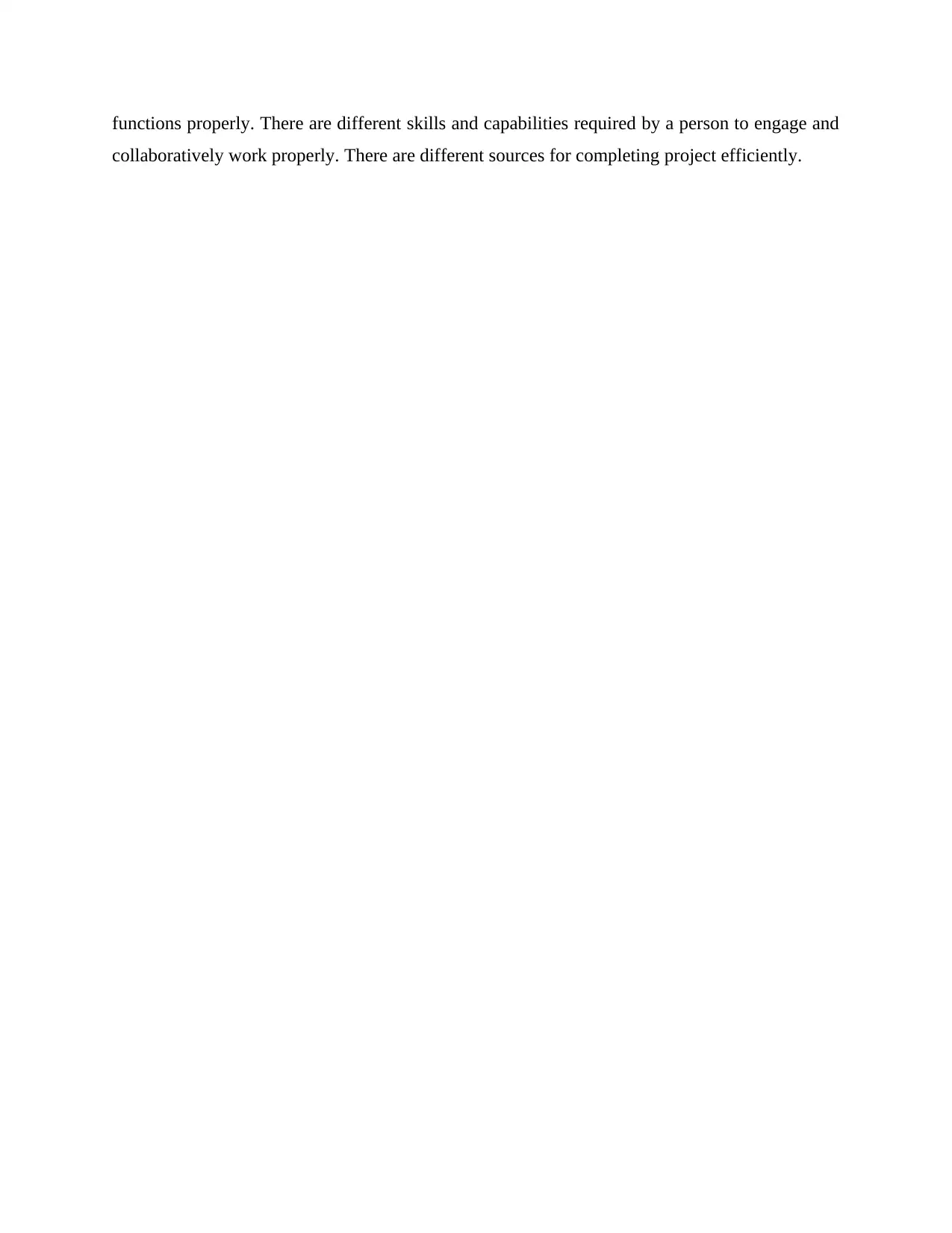
functions properly. There are different skills and capabilities required by a person to engage and
collaboratively work properly. There are different sources for completing project efficiently.
collaboratively work properly. There are different sources for completing project efficiently.
Paraphrase This Document
Need a fresh take? Get an instant paraphrase of this document with our AI Paraphraser
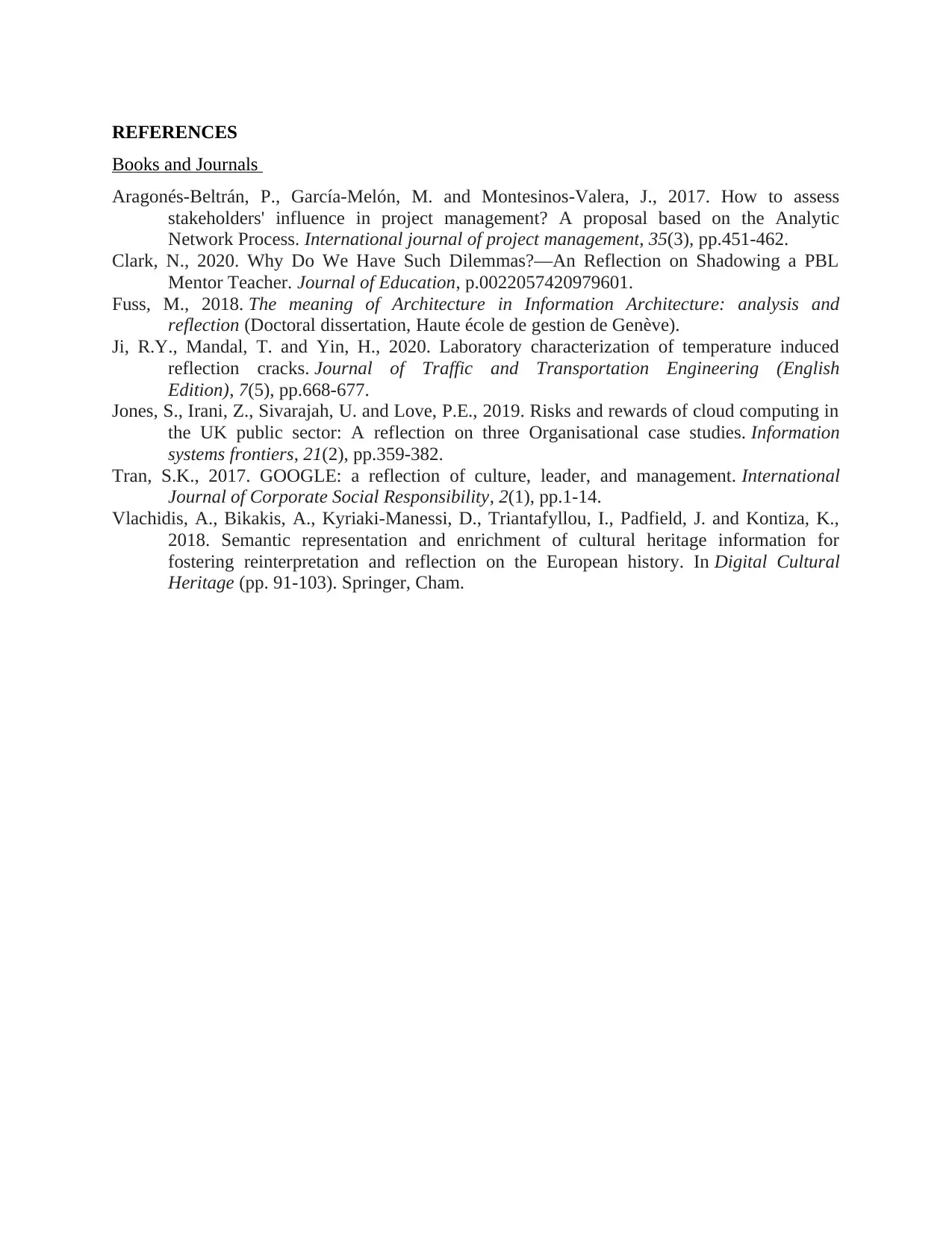
REFERENCES
Books and Journals
Aragonés-Beltrán, P., García-Melón, M. and Montesinos-Valera, J., 2017. How to assess
stakeholders' influence in project management? A proposal based on the Analytic
Network Process. International journal of project management, 35(3), pp.451-462.
Clark, N., 2020. Why Do We Have Such Dilemmas?—An Reflection on Shadowing a PBL
Mentor Teacher. Journal of Education, p.0022057420979601.
Fuss, M., 2018. The meaning of Architecture in Information Architecture: analysis and
reflection (Doctoral dissertation, Haute école de gestion de Genève).
Ji, R.Y., Mandal, T. and Yin, H., 2020. Laboratory characterization of temperature induced
reflection cracks. Journal of Traffic and Transportation Engineering (English
Edition), 7(5), pp.668-677.
Jones, S., Irani, Z., Sivarajah, U. and Love, P.E., 2019. Risks and rewards of cloud computing in
the UK public sector: A reflection on three Organisational case studies. Information
systems frontiers, 21(2), pp.359-382.
Tran, S.K., 2017. GOOGLE: a reflection of culture, leader, and management. International
Journal of Corporate Social Responsibility, 2(1), pp.1-14.
Vlachidis, A., Bikakis, A., Kyriaki-Manessi, D., Triantafyllou, I., Padfield, J. and Kontiza, K.,
2018. Semantic representation and enrichment of cultural heritage information for
fostering reinterpretation and reflection on the European history. In Digital Cultural
Heritage (pp. 91-103). Springer, Cham.
Books and Journals
Aragonés-Beltrán, P., García-Melón, M. and Montesinos-Valera, J., 2017. How to assess
stakeholders' influence in project management? A proposal based on the Analytic
Network Process. International journal of project management, 35(3), pp.451-462.
Clark, N., 2020. Why Do We Have Such Dilemmas?—An Reflection on Shadowing a PBL
Mentor Teacher. Journal of Education, p.0022057420979601.
Fuss, M., 2018. The meaning of Architecture in Information Architecture: analysis and
reflection (Doctoral dissertation, Haute école de gestion de Genève).
Ji, R.Y., Mandal, T. and Yin, H., 2020. Laboratory characterization of temperature induced
reflection cracks. Journal of Traffic and Transportation Engineering (English
Edition), 7(5), pp.668-677.
Jones, S., Irani, Z., Sivarajah, U. and Love, P.E., 2019. Risks and rewards of cloud computing in
the UK public sector: A reflection on three Organisational case studies. Information
systems frontiers, 21(2), pp.359-382.
Tran, S.K., 2017. GOOGLE: a reflection of culture, leader, and management. International
Journal of Corporate Social Responsibility, 2(1), pp.1-14.
Vlachidis, A., Bikakis, A., Kyriaki-Manessi, D., Triantafyllou, I., Padfield, J. and Kontiza, K.,
2018. Semantic representation and enrichment of cultural heritage information for
fostering reinterpretation and reflection on the European history. In Digital Cultural
Heritage (pp. 91-103). Springer, Cham.
1 out of 8
Related Documents
Your All-in-One AI-Powered Toolkit for Academic Success.
+13062052269
info@desklib.com
Available 24*7 on WhatsApp / Email
![[object Object]](/_next/static/media/star-bottom.7253800d.svg)
Unlock your academic potential
Copyright © 2020–2026 A2Z Services. All Rights Reserved. Developed and managed by ZUCOL.




